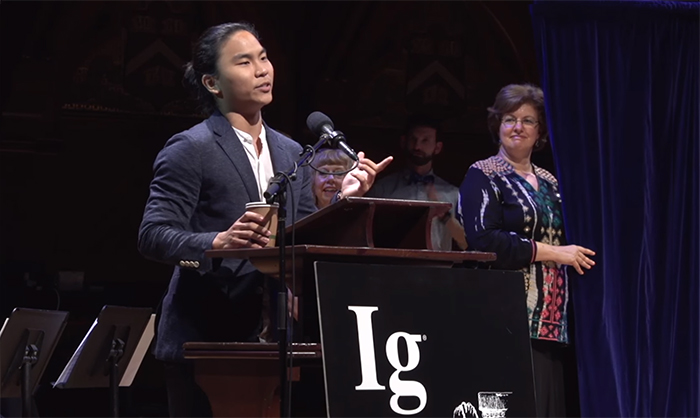
Korea’s Han Jiwon, winner of the 'Fluid Dynamics Prize' at the 2017 Ig Nobel Prizes, explains his research results during a ceremony at Harvard University on Sept. 14. (ImprobableResearch YouTube channel)
By Xu Aiying and Kim Young Shin
The Ig Nobel Prizes, whose name is a pun on the word "ignoble," are a parody of the actual Nobel Prizes.
The awards are presented by the Annals of Improbable Research (AIR), a science magazine that has published “research that makes people laugh and then think” at Harvard University every year since 1991.
The ceremony is held two to three weeks prior to the announcement of the actual Nobel Prize winners each year. Just like the Nobel Prizes, the Ig Nobel Prizes recognize achievements in 10 categories, including physics, biology and fluid dynamics.
Many of the research results presented at the ceremony end up receiving laughs from the audience. However, the winners don’t stop there.
Russian researcher Andre Geim is a representative case of such winners. He won the Physics Prize of the Ig Nobel Prizes in 2000 for using magnets to levitate a frog. Ten years later, he became an actual Nobel laureate in physics for “experiments regarding the two-dimensional material graphene.”
The 27th ceremony for the Ig Nobel Prizes was held at Harvard University on Sept. 14. Han Jiwon, a sophomore at the University of Virginia, won the Fluid Dynamics Prize this year.
He won for his research titled “A study on the coffee spilling phenomena in the low impulse regime.” His acceptance speech made people laugh and then think.
“I did learn a very important lesson from this research, and it is that research is not about how old you are. It’s not about how smart you are. It’s about how much coffee you can drink,” he said. “With enough coffee drinks and a little bit of bad luck, you might end up in Boston.”
Other winners of this year’s Ig Nobel Prizes include Milo Puhan from Switzerland who won the Peace Prize for “demonstrating that regular playing of a didgeridoo is an effective treatment for obstructive sleep apnoea and snoring,” and Matthew Rockloff from Australia who won the Economics Prize for his experiments “to see how contact with a live crocodile affects a person’s willingness to gamble.”
xuaiy@korea.kr